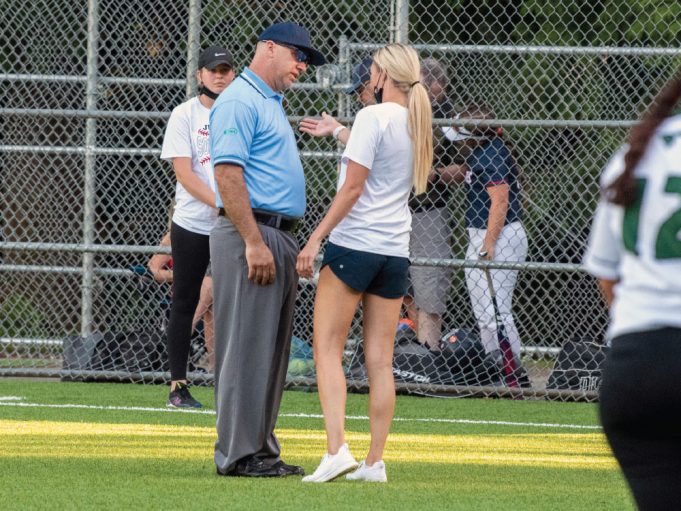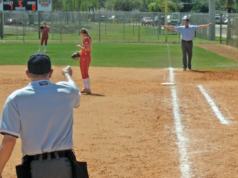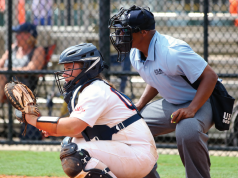F
or umpires, one of the most important skills is game management. And perhaps the most important skill when it comes to being a good game manager is being a good communicator. It is imperative umpires are able to effectively communicate with game administration, players and coaches alike. Umpires need to know how to communicate, both verbally and non-verbally, with coaches in order to keep things moving smoothly. Below are some tips to help communicate with coaches and help keep you out of trouble during your games.
Listen First, Speak Second
In order to be good communicators, umpires must first be good listeners. Too often, umpires want to explain calls and get both the first and last word in edgewise. If you choose to speak first, you may be trying to answer something a coach isn’t even questioning. Coaches come out of the dugout or coach’s box for a variety of reasons. It is important to find out why the coach is there in the first place before speaking. It may just be a coach wants to vent or give the appearance of fighting for the team and protecting players. There may not even be a question. Sometimes, a coach just wants someone to listen. If an umpire starts talking and explaining, that coach may feel like the umpire isn’t approachable or genuinely isn’t interested in that coach’s point of view. Take a second, let the coach speak first and then answer only the questions asked.
Show Empathy
Coaches genuinely want to know umpires care. If an umpire doesn’t care, it will show in both body language and the words an umpire chooses when speaking. At most levels, coaches are fighting for their jobs and their jobs are based on wins and losses. They want to know the person adjudicating their games is willing to give them a fair shake and understand where they are coming from when they come out to ask questions. Use body language to show you understand what the coach is saying.
Silence Can’t Be Misquoted
Umpires tend to get themselves in trouble when they talk too much. Whether it is talking to one coach too much when first entering the field, carrying on an excessively long lineup exchange at the pregame conference at home plate, or excessive communication during the game, nothing good can come from doing any of those. Keep conversations short and sweet and keep them to a minimum. Do not go actively looking for conversations with coaches or players. Anything you say can and will be used against you. The less you say, the better. That doesn’t mean not to answer questions or be polite when players or coaches introduce themselves or try to start a conversation. It means simply respond and then don’t continue carrying on the conversation for long periods of time. Someone is always watching and will want to know why you are being overly communicative with an opposing player or coach.
Stick to Rulebook Language
Using the verbiage in the rulebook is paramount. If you say something that isn’t in the rulebook and stray off script, you potentially open yourself up for an extended conversation, or worse, a protest. Use the time it takes for a coach to get out to you to rehearse what you are going to say. It is natural to get nervous when someone questions a call. If you have a couple moments to take a deep breath, collect your thoughts and rehearse what you are going to say; it makes it much easier. This doesn’t mean a coach is going to agree with your judgment, but if you are able to explain the rules as they are written and explain why you made the call, it can save a lot of headaches. If you stumble over your words or you don’t explain the rule correctly, coaches will not trust you or believe you have confidence in your call.
De-escalate the Situation
Not all situations are created equal and not all coaches work the same way. Some coaches simply want an explanation and move on. Others may be more animated and want to be confrontational. As umpires, our first job is to de-escalate the situation. There are a few ways to help this. One is to make sure you are not face to face with coaches. Try to stay to the side so it doesn’t appear that you are being confrontational. When the coach is speaking, listen. Do not try to talk over the coach, unless of course they are being unsportsmanlike and you need to get them to refrain to avoid being ejected. Otherwise, try to listen to what the coach is saying. By nodding your head or saying, “I understand,” it will show the coach you are listening and trying to see where the coach is coming from. Then once the coach is done asking the questions, in a calm voice, answer why you made the call you made. If you try to talk at the same time, there is no active listening taking place and you will further complicate the issue.
Carefully Word Warnings
When coaches cross the line, we need to use the tools in our belt to deal with them. One of the ways we can do that is through warnings. However, be careful what you say when giving a warning. We can back ourselves into a corner if we say certain phrases. Avoid phrases like, “Don’t say another word.” What happens if the coach says, “Word”? You have now backed yourself into a corner and you either have to eject the coach or worse, if you don’t, the coach knows the warning was an empty threat. Instead, simply say, “Coach, this is your warning for arguing balls and strikes,” or whatever the warning may be for. Then if the coach continues to argue, you eject him or her.
Don’t Take It Personally
After a coach comes out and questions a call, you have to be able to forget it and move on. Remember, coaches are not taking it out on you personally. They are taking it out on the uniform — unless of course they start the sentence with the word “you.” Then it is personal and see the tip above this one about giving a warning. Otherwise, learn to quickly flush it and move on to the next play at hand. Once that conversation is over, coaches and umpires both need to let it go. You can remember it as a postgame conversation with partners, but don’t allow it to become a sticking point for the rest of the game.
Communication with coaches happens multiple times a game and the best umpires are able to manage those interactions calmly and professionally. While it is important to focus on mechanics and rules throughout the season, it is just as important to work on your interpersonal skills. Take time to become an effective communicator and it will dramatically increase your effectiveness on the field and will help elevate your career.
What's Your Call? Leave a Comment:
Note: This article is archival in nature. Rules, interpretations, mechanics, philosophies and other information may or may not be correct for the current year.
This article is the copyright of ©Referee Enterprises, Inc., and may not be republished in whole or in part online, in print or in any capacity without expressed written permission from Referee. The article is made available for educational use by individuals.


















